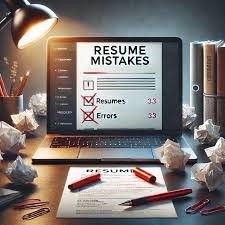
A resume is one of the most essential tools that job seekers rely on to make a powerful first impression on employers! It’s not just a document filled with qualifications and experiences; it’s your golden opportunity to showcase your skills and potential in the best light possible. ✨
-
Failing to Tailor the Resume for the Target Job
Mistake:
One of the most common mistakes applicants make is sending the same resume for every job they apply for. This approach can lead to missed opportunities, as employers are looking for candidates who closely match their specific requirements.
Solution:
Customizing your resume to the job you’re applying for is a game-changer. It significantly boosts your chances of catching the eye of employers. Start by tweaking the skills and experience sections to match the job description. Pay close attention to the keywords used in the job posting and incorporate them into your resume. This strategy not only improves your chances of getting noticed but also helps your resume pass through Applicant Tracking Systems (ATS) more effectively.
-
Overusing Long Sentences and Complex Phrases
Mistake:
Using long and complex sentences can make it difficult for the reader to quickly understand the content. Convoluted information can distract the reader’s attention and render your resume less appealing.
Solution:
Using clear and concise language in your resume is key. It makes your information more digestible and easier for employers to understand. Be direct and to the point when describing your experiences and skills. Consider using bullet points to make your qualifications stand out. Remember, employers are often pressed for time, so your information should be easy to understand and flow smoothly.
-
Omitting Essential Information
Mistake:
Some applicants forget to include essential information such as contact details or educational background. This can prevent employers from reaching out to them, which is crucial in the hiring process.
Solution:
Ensure that all essential information is included at the top of your resume, such as your name, phone number, and email address. You should also add the education and work experience sections clearly. This information should be visible and easily accessible, as employers often look for contact details quickly.
-
Neglecting Proofreading:
Mistake:
Spelling and grammatical errors can create a poor impression of you as a candidate. It is important for your resume to be free of mistakes, as even a simple error can reduce your chances of getting the job.
Solution:
Review your resume multiple times, and ask someone else to read it to ensure there are no errors. You can also use online proofreading tools. If you have friends or colleagues who are fluent in English, do not hesitate to ask for their help in proofreading.
-
Failing to Highlight Achievements
Mistake:
Focusing only on job duties without mentioning achievements can lead to a boring and unappealing resume. Employers want to know what you have accomplished and how you can add value to their team.
Solution:
Adopt an “achievements” approach instead of a “duties” one. Mention the results you achieved and how your work impacted the company in tangible ways. Use numbers and statistics whenever possible, such as “increased sales by 20%” or “improved operational efficiency by 30%.” This type of detail makes your resume more attractive and showcases the value you can provide.
-
Neglecting Resume Formatting
Mistake:
A disorganized or poorly arranged resume can make it difficult for the reader to follow the information. Good formatting enhances the readability of the information and helps highlight key points.
Solution:
Ensure that you use a clear and organized format. Use easy-to-read fonts and ensure appropriate spacing between sections. Subheadings can help organize content and make it clearer. Ensure that each section is written consistently, making it easier for the reader to navigate through the information.
-
Using Unattractive Headings
Mistake:
Using a generic title such as “Resume” can make it less distinctive. Titles should reflect your professional identity and help capture the reader’s attention.
Solution:
Use a professional title that includes your name and the job title you are targeting. For example: “Resume for [Your Name] – Professional in [Your Field].” This type of title demonstrates professionalism and leaves a positive first impression.
Conclusion
Avoiding common mistakes in writing your resume can make a significant difference in your job prospects. By tailoring your resume, proofreading it, highlighting your achievements, and using appropriate formatting, you can create a comprehensive and attractive resume that significantly increases your chances of success in the job market. This potential impact should inspire and motivate you to put in the effort to write a strong and effective resume. For more check Southeastern Louisiana University article about most 5 common mistakes in resume!
Additional Tips to Improve Your Resume:
-
Use simple and direct language: Emphasizing clarity makes the information easier to understand.
-
Regularly updating your resume is crucial: Your skills and experiences evolve over time, and your resume should always reflect these changes. This practice ensures that your resume is always up-to-date and accurately represents your current qualifications.
-
Seeking feedback from professionals in the field: It can be a valuable step in enhancing your resume. Their insights can provide you with a fresh perspective and help you refine your document, giving you a sense of reassurance and guidance in the process.
By implementing these tips, you will be on your way to writing a strong and effective resume that perfectly reflects your skills and experiences. And now since your resume is fully ready, You may like to check our article about 9 Steps of How to Successfully Prepare for Job Interviews